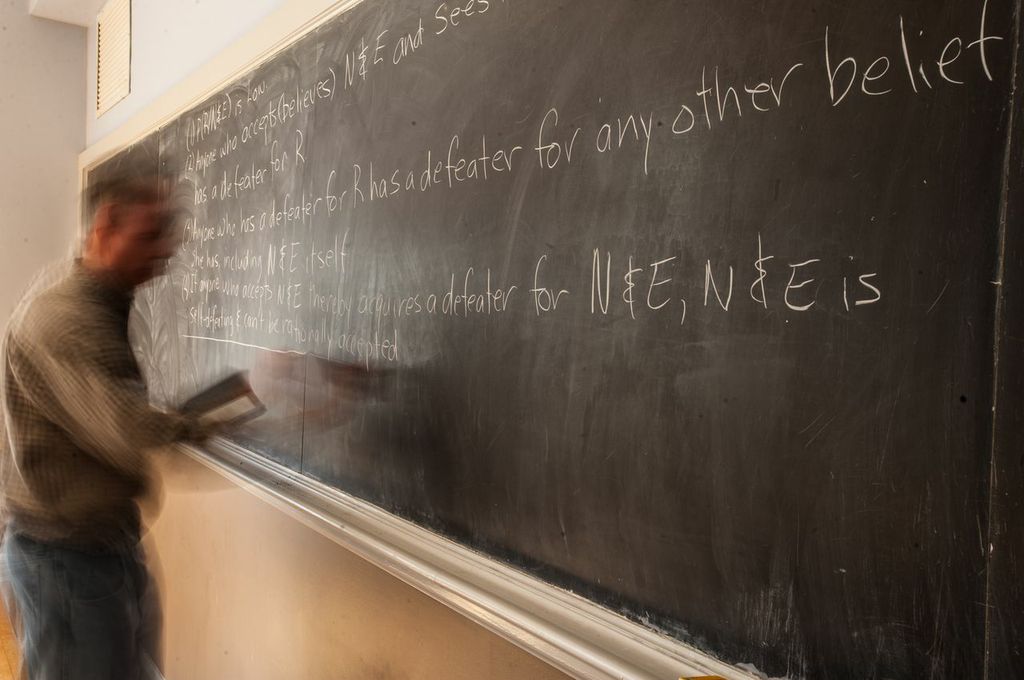
Monica Greenwood (pseudonym) is semi-patiently excitedly awaiting the day she walks into her first graduate seminar in philosophy. Until then, she is an undergrad studying philosophy at a state school known for its agriculture program.
—————————–
In contemporary America, we have whittled the purpose of college down to pre-job entry training and partying on the side, so it makes sense that a Christian’s vision of college is blurred by the misconceptions of their culture. Indeed, it makes further sense if we realize that our culture’s vision of the college years is fundamentally distinct from what God’s vision for the college years is. And yet often enough, we don’t see the discrepancy between our vision of college and the Lord’s, and find ourselves being frustrated when He doesn’t deliver the college experience we expect to be our rightfully ours.
If you walk into your first college class expecting that academics will be the main focus and most important aspect of your college career, the Lord may need to do some adjusting in your vision of college. As He transforms us into His image (2 Corinthians 3:18), He moves aside the lies of our culture, as our view of things slowly (and sometimes imperceptibly) becomes transformed into His vision of things. He certainly has needed to do this kind of tweaking in my vision. Along the way, I’ve been forced to learn that academics, while they may make up the pragmatic reason why we attend or do not attend a specific school, are not always the main focus of the Lord during our college years.
I want to qualify my point by noting that not all of my readers’ situations will be similar to mine. Some of you will be called by the Lord to pursue your studies with all your strength, and academics will be His focus for you during your studies. My objective here is to point out that that academics is not necessarily and automatically the focus of God for our time in college.

Over my last break, I began the process of visiting graduate schools by flying down to the South for a visit to talk with counselors and faculty at the top non-secular grad school on my list. I hadn’t expected to love the school as much as I did, or be as blessed and encouraged as I was while down there. I felt the Lord’s presence in my conversations with faculty there, and pieces of my thinking began to click. Christ was honored in word, in deed, and in studies. As a student coming from a spiritually dry state school, visiting the Southern school was like finding an oasis after a long sojourn in the desert. It was water for my soul directly from the Lord.
But when the last cup of coffee had been drunk, the last question asked, and the last sigh escaped as I left the campus that suddenly felt so natural to me, my heart went to resentment at the Lord and what I was returning to in the next few days at my undergraduate college. There was my desert: a small program that simply wasn’t suited to my specific interests, where I didn’t need to work extremely hard in to excel, and most of all, a place where Christian fellowship in the classroom, philosophy in pursuit of knowledge of Christ, was completely absent. It felt like visiting the oasis, only to return to the academic desert.
However as I talked with mentors afterwards, I was reminded that as bleak and frustrating as my undergrad academic experience is, it is frustrating because I am focused on my own goals for my time as an undergrad, not on the Lord’s goals. He clearly sent me to this agriculture-focused state school to grow in Him, to learn from Him, and to learn how to witness to people around me in a culture dominated not by His powers, but by the prince of the power of the air. Has God sent you on this kind of mission to your campus?
Again and again, the Lord has told me that frustration and disappointment with my current situation arise directly from failing to focus on His specific goals for my time as an undergrad. “Remember,” He says, “it was I who placed you where I have you.”
There are other programs, I know, where my needs as an academic student following Christ could be better met, but they would only be better if the Lord was asking me to focus on academics within my undergraduate career. But I’ve found through this experience that His vision is far greater, and far wider than mine. My book-adoring, school-loving heart is focused on the microcosm of a poor academic program, while His vision is focused on the macrocosm of a school where I can take steps in faith to serve Him and share Him with others.
So, Emerging Scholars, let’s guard our hearts, and retrain our focuses. Frustration and resentment can outpour from a heart that is not submitted to the Lord’s vision, and is distracted by our culture’s vision. His plan is for our good, not for our harm (Jeremiah 29:11), and it is our great privilege to rest in that plan, and in His vision.
—————————–
Editor’s note: The Emerging Scholars Network looks forward not only to future posts by Monica, but also other Emerging Scholars who desire to provide a window into how Christ followers in higher education wrestle with and press on in their calling. As we move toward graduation, I am particularly interested in stories which speak to academic transition (undergraduate to graduate school, graduate school/postdoc to _______, one faculty/academic position to another) — both by those “in the thick of it” and others who reflect back upon the experience. If you desire to contribute to the Emerging Scholars Network blog, please check out this page and drop us a “proposal” via this link.

Monica Greenwood (pseudonym) waited impatiently for three years for the day she walked into her first graduate seminar in philosophy. Before that momentous day, she was an undergrad upperclassman studying philosophy at a state school known for its agriculture program. Today, she writes, studies, teaches, and her passion remains the same: the education of undergraduates, specifically underclassmen, in introductory philosophy courses.

Hi Monica,
Thank you for sharing your perspective. I greatly appreciate your reflections from Jeremiah. “Dwell in the land and befriend faithfulness,” from Psalm 37, has resonated with me during my time in graduate school. Your desert experience as an undergraduate and your deepening faith will surely serve you well when you begin to navigate graduate school.
Grace and Peace,
Robert
I love your comments on how His vision is so much greater than our vision. I can’t tell you how many times I’ve looked back and said “Oh! THAT is why I went through those experiences!”
A passage in Isaiah that I continually find meaningful is Isaiah 30:20-21 –
Although the Lord gives you the bread of adversity and the water of affliction, your teachers will be hidden no more; with your own eyes you will see them. Whether you turn to the right or to the left, your ears will hear a voice behind you, saying, “This is the way; walk in it.”
Interesting to think of the hidden “teachers” present in every part of life.
Thanks, Monica! You’re so right that His vision is bigger than ours, and we need to make decisions based on listening to God (and based on our own desires, strengths, skills, interests…) Worldly success doesn’t always have to be our goal, and I’m looking forward to further blogs from you about your experiences in grad school.
At the same time, I want to point out for others reading this (and I blogged about this in November, https://blog.emergingscholars.org/2012/11/being-a-christian-at-a-christian-university/) that being at a Christian school doesn’t always translate into a spiritually enriching experience, nor does a secular environment have to mean spiritual dryness. That was a really hard lesson for me to learn when I moved from a secular graduate program (where I had great spiritual support through my church and campus fellowship group) to a Christian university (where everyone takes faith for granted and it feels like no one has time to meet for prayer or Bible Study).
It seems from your blog that you are following God’s leading on your life, and that’s exciting. But for anyone else in your situation who may read this later, I want to point out that it’s probably not as simple as a secular vs Christian graduate program.
Robert and keseaton,
Interestingly enough, both of the passages you mentioned have been extremely encouraging in my past experiences. What a blessing to watch the Lord care for each of us through His word!
Kate,
I absolutely can appreciate that sentiment. One of the ways the Lord led me to the school I chose for my undergrad was exactly what you pointed out, that the Christian community where I am right now is more bold and stalwart than some of the Christian schools I visited. The focus of this post was more on Christian life within the classroom, not out of it, so I appreciate you clarifying my point. Within the classrooms, I noticed that the wealth of Christian community was extremely more vibrant at the non-secular school than it was at my secular school. My point for this blog was simply to point out that academics is not the automatic focus of the Lord for our time in college, that the Lord’s vision is far greater than ours is in this area.
I’ve enjoyed reading your own blogs here at ESN in the past and look forward to more.
-Monica